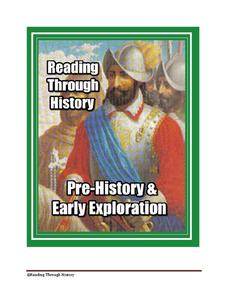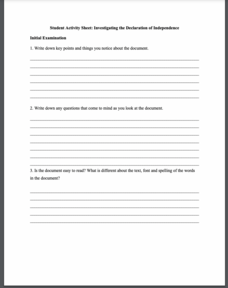Reading Through History
The Federalist Papers: Federalist Paper No. 10
James Madison, under the pen name “Publius,” justifies the need for an American Republic in Federalist Paper 10, which is perhaps one of the most influential contributions to the Federalist Papers. Readers examine his perspective with...
Reading Through History
The Emancipation Proclamation
The Emancipation Proclamation: one of the most important primary sources for studying American history! An interdisciplinary resource includes a reading of Abraham Lincoln's seminal speech quoted directly. Following the reading, pupils...
Reading Through History
Early History and Exploration Unit
We all know about Christopher Columbus, but who else explored the Americas, and specifically, the future United States of America? Learners find out these answers and more in a resource that includes four different reading sections,...
Reading Through History
The Fugitive Slave Act of 1850
Why was the Fugitive Slave Act of 1850 so important? The reading in the resource discusses how the act affected Southerners, Northerners, and the slaves themselves. Scholars complete the reading as a form of direct instruction while...
Reading Through History
Patriots and Loyalists
Patriots versus Loyalists, a huge divide during the Revolutionary War in what would become the United States of America. An informative resource includes both direct instruction about the two groups and a quiz pupils take after reading...
Judicial Learning Center
The Bill of Rights and Civil Liberties
Why is the Bill of Rights so important to American's civil liberties? An important resource helps scholars find these answers and more by reading through state and federal constitutions to discover their own civil liberties. The activity...
Judicial Learning Center
Do You Know Your Bill of Rights?
The Bill of Rights is much more than an important piece of paper! The rights cover everything from freedom of speech to the right to remain silent if arrested. Scholars find out their own rights by answering the questions in the form of...
Judicial Learning Center
Article III WebQuest
Why is Article III of the constitution so significant? Pupils discover the importance of Article III and how it relates to past as well as current events by completing Internet research using a provided handout. They learn everything...
State Bar of Texas
McCullough v. Maryland
Can a state government tax the federal government? The Supreme Court case McCullough v. Maryland explores different governments in the United States. Scholars research the court's decision with a video and discussion. They formulate...
State Bar of Texas
Worcester v. Georgia
Can the president of the United States defy the rulings of the Supreme Court? Students investigate the case of Worcester v. Georgia and the impact it had on society and, most importantly, Native Americans. Using a short video clip as...
University of Texas
Scarcity
How can having too little of something impact your life? Scholars investigate the concept of scarcity in their own lives and in the overall picture of the economy. Brainstorming activities as well as student-parent work bring to light...
Curated OER
Turning Assets into Action in the Fight Against Hunger
How can one person change the world? Scholars research and analyze the topic of world hunger. Using video clips, parodies, and primary source evidence, they uncover a current campaign to end world hunger. Collaborative groups openly...
National Endowment for the Humanities
Lost Hero: Was John Hanson Actually the First President?
The first president of the United States was ... John Hanson? Scholars investigate the notion that the initial leader of the nation was not George Washington. Using research, articles, and open discussion, individuals create a quest for...
National Endowment for the Humanities
The "To Do List" of the Continental Congress
What is on your to-do list today? The second lesson plan of a three-part series on Lost Heroes of America investigates the laundry list of items in front of the second Continental Congress. Scholars research, analyze, and present...
Education Fund
Fear the Scarce Resources
In a life or death situation, what resources would you choose to survive—and why? A zombie attack simulation teaches learners the concepts of scarcity and resources in regards to economics. The hands-on activity requires individuals to...
The Alamo
The Alamo
Remember the Alamo! Scholars investigate the Battle of San Jacinto during the Texas Revolution. Using models, maps, quotes, biographies, and the Oath of Allegiance, the Alamo comes to life as the stories of those who fought and died in...
US National Archives
Benjamin Franklin: Politician and Diplomat
A scientist, inventor, entrepreneur, politician, and the founder of a nation—and that's just one person! Learners investigate the many lives of Benjamin Franklin. Using a hands-on interactive online resource, they analyze primary...
Arizona State University
Declaration of Independence: A Transcription
The Declaration of Independence may seem like an outdated document, but it exists as one of the most important to the United States government. Middle and high schoolers read the declaration, complete a graphic organizer, and take notes...
Constitutional Rights Foundation
The Declaration of Independence
Your class can write a PSA about the Declaration of Independence! They write public service announcements and present them to the class. They also engage in reading and discussion activities to further understand a challenging—yet...
Teaching American History
Interpretation of the Declaration of Independence
Ready to interpret the Declaration of Independence and understand its meaning? The resource divides scholars into pairs, where they work as a team to match translations with excerpts from the declaration. The class then engages in...
The Alamo
A Lesson in Citizenship
What does it mean to be an American citizen? Lieutenant Colonel Commander William Barret Travis believed that it meant honor to country first—even above one's own life. Middle and high schoolers read his final letters from the Alamo that...
Roy Rosenzweig Center for History and New Media
Investigating the Declaration of Independence
Teach your class about the Declaration of Independence while giving them practice working as a team. The resource breaks participants into groups and has them answer questions about specific grievances from the Declaration of...
The Alamo
The Alamo Crossword Puzzle
Sort out who's who from the Battle of the Alamo with a helpful crossword puzzle. Complete with 20 clues and names, the resource helps history learners identify the major players in a pivotal moment in American history.
Kentucky Department of Education
Kentuckians in the Civil War Era: Constructed Response Essay
What part did Kentucky play in the Civil War? A constructed response essay assignment tests to ensure scholars understand the concepts and the arguments for the causes of the Civil War. Learners must read a primary source quote and then...

























